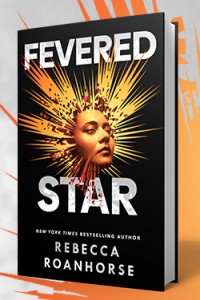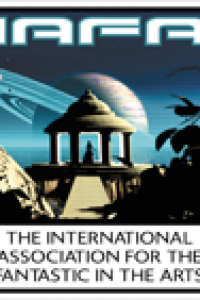Let us go then, you and I: an introduction to speculative poetry
Mike Allen’s first short story collection, The Button Bin and Other Horrors, is scheduled for an early fall release from Apex Publications. He’s been a finalist for the Nebula Award for short fiction and won the Rhysling Award for poetry three times. He’s written two novels, both of which are house-hunting. He’s also editor of the poetry journal Mythic Delirium (new issue here) and the acclaimed anthology series Clockwork Phoenix. He records a monthly column, “Tour of the Abattoir”, for the Tales to Terrify podcast site. He lives in Roanoke, Va., with his wife Anita, a goofy dog, and two cats with varying degrees of psychosis.
Have you read Catherynne M. Valente’s “The Eight Legs of Grandmother Spider“?
Or Joe Haldeman’s “Eighteen Years Old, October 11th“? Or Geoffrey A. Landis’ “Fireflies“?
The late John M. Ford’s World Fantasy Award-winning “Winter Solstice, Camelot Station“? Or the late Phyllis Gotlieb’s hilarious “ms & mr frankenstein“?
Or Theodora Goss’s “Octavia Is Lost in the Hall of Masks“?
(Or even this little favorite of mine, by a writer you’ve likely not heard of, Ken Duffin, called “Meeting Place“?)
Go ahead and click. I can wait. If not, I hope you’ll go back and read them all, and not stop there. If you’ve clicked even two or three, you’ll note that these are all poems. There’s hundreds, hundreds more I could pick from – these are just a few that are dear to me.
When I get asked to talk about speculative poetry, this is what I do: stand up in front of the audience and read a few poems and talk about them. Today I’m projecting out into the blogosphere, so we’ll have to use the honor system.
There’s no hard boundary that defines what counts as “speculative poetry,” “science fiction poetry,” “poetry of the fantastic,” whatever you want to call it. A purist would tell you it’s a poem that’s clearly set in a reality other than our own. Examples of that abound, of course, going back to “Beowulf” and “The Odyssey”, though I’m not so sure the creators of those epics thought of their contents as fantasy fiction.
But you’ll notice that the very first poem I showed you, by Cat Valente, doesn’t follow this rule. It’s a colorful recounting of an old myth, but it’s also a haunting memoir, a weaving of non-fiction and fable. That’s just fine. My days of being a purist are well behind me. This poem satisfies that urge I have to experience and be moved by the otherworldly that drew me to science fiction and fantasy over and over again.
The others I’m tossing at you: they’re closer to that “other reality” stricture, but they’re still all over the place. Haldeman offers a simple, elegant mediation on what the passage of millennia can mean. Landis, a NASA scientist, gives us a portrait of the universe that leaves the lecture hall to gaze at the stars — Walt Whitman surely would have applauded. Anticipating steampunk, the late Mike Ford re-imagines Camelot as a train station, building an engine in verse powerful enough to earn the adoration of the 1989 World Fantasy Award judges – taking home the Lovecraft head for short fiction, interestingly enough. Here I’ll point out that speculative poems often function like tiny short stories, mini-narratives, tale-telling in another format.
And here are examples of this at two opposite extremes. Gotlieb’s silly and surreal madhouse Beat poem demands to be recited aloud at a poetry slam, but what kind of science fiction is this? A Frankenstein monster made of random household junk? Goss’s tragic fever dream has corsets and daggers, but is there really anything magical going on here? Are these masks only given voice in our doomed heroine’s head? And yet they feel like fantastic tales, and they set out to do what they want to do with remarkable economy.
(Duffin’s piece, wistfully imagining a romantic reunion after the universe ends? Well, I just like it. Make of it what you will.)
This is one aspect of speculative poetry worth noting: authors who have won Hugos and Nebulas, been New York Times bestsellers and critical darlings, who are venerable old hands or edgy newcomers, doing work that’s just as evocative and thought-provoking in a form measured by lines rather than SFWA-defined word counts.
Where do you find this work? For one, in the same places you find short fiction: Asimov’s Science Fiction, Strange Horizons, Apex Magazine, Bull Spec, Abyss & Apex, sometimes even Analog. There’s also some spectacular websites and old-school DIY zines devoted completely to this particular subdivision of the arts: Stone Telling, Goblin Fruit, Mythic Delirium, Dreams & Nightmares, Jabberworcky, Star*Line, to name a few. Each one has a unique approach. Some even strive to fill gaps in the literature: Goblin Fruit, for example, focusing on fantasy and myth; Stone Telling focusing on diversity in all its forms.
Watch for readings at conventions, too. (Here’s a tip: do not, do not, do not miss a chance to hear C.S.E. Cooney perform her poem “The Sea King’s Second Bride“.)
I make no claims that speculative poetry is some profound literary movement. Rather it’s a steady trickle that’s been here all along and will continue to flow for as long as the act of composing poetry remains a thing humans do. I’m simply suggesting that if you’re a completist, if you are truly curious about everything speculative, and you haven’t ventured outside the kingdom of novels to test waters in the poetry stream, then there’s some amazing stuff you’re missing out on.
So stop missing out. Have a taste, or two, on me.





Until the link to the Gotlieb poem can be fixed in the post, I want to make sure it’s accessible anyway: http://www.chizine.com/ms_and_mr_frankenstein.htm
Thanks to Karen and Locus for letting me have the mic!
Pingback:SF Tidbits for 5/9/12 - SF Signal – A Speculative Fiction Blog
Speculative poems, love poems, war poems, seasonal poems, weather poems, flower poems, mortality poems, childhood-trauma poems, whatever poems. I confess that I care less about the subject matter of a poem than about what makes it a poem, which is to say how it uses language. A poem is neither an essay nor a story, though there are narrative poems and essays in verse. When it comes to addressing the issues and questions that occupy SF, my favorite science fiction poet is Robert Frost.
Poetry, like any art, is evaluated by the longitudinal audience. But in the short run (which is where we all live), a substitute for that standard might be whether and how much a poem demands and rewards re-reading: does it retain its appeal over the longitude of a lifetime? Is it news that stays news–and does the language call me back to it, no matter what the topic might be?
Great post, Mike!
@Russell, I understand your sentiment, and I hope that someday you consider setting down your decades-old Robert Frost book and venturing outside to see what’s new in the world.
@Amal: Thank you!
Got that link fixed, sorry about that!
Thanks Karen, no prob!
@Mike–What makes you think I haven’t?
I think I liked the line about “my days of being a purist are well behind me” the best. That just conjured up an image of young Mike Allen I’ve never encountered in my imagination before. I see you in a costume like they wear in The Crucible. They call you Goody Allen, and you have a little farm. Cool.
@Claire: I’m surprised you don’t imagine me compressing people under heavy rocks.
@Russell: With all due respect, your comment gives no indication you’re familiar with any poetry written after 1963.
Regarding your standard for what you like in a poem, it’s perfectly fair; however I have to imagine the poems that remain news to me over the length of my lifetime might well be very different than what works for you or for Karen or for anyone else reading this. I’ve shared some specific favorites of mine, with no predictions to make about their eventual immortality.
As for how these poems use language: well, explore Cat Valente’s work alone, or the pages of GOBLIN FRUIT or STONE TELLING and you’ll find some dazzling stuff. There’s lots of fascinating play with language happening in this little corner, and even in the poems I linked to.
BTW, I do not dispute the excellence of Frost. Who would? But when it comes to favorite dead white male English language poets who trip the speculative switch, I’m an Eliot man.
Tastes vary. Thresholds of “why bother?” vary.
Teaching poetry was part of my job for a couple of decades after 1963 (starting in 1966, if anyone’s keeping score), and the range I taught covered everything in recognizably modern English from the 16th century to last week. (You don’t start undergrads with Beowulf or Chaucer in the original.) But my personal tastes (as distinct from my systematic poetics or my notions of what constitutes a useful reading list for, say, an into course) are related only sideways to that, and there’s not much point in disagreeing about taste. I have to say, though, that I don’t dazzle as easily as I did fifty years ago.
I certainly hope that, 50 years from now, I’ll still find new things to dazzle me. Though I kind of love the idea of peering over my glasses at some fresh-faced new poetry advocate and harrumphing, “They’ll never do it better than Cat Valente did!”
@Mike – great post, thank you!
@Russell – we love speculative poetry because we find the best of it meaningful, beautiful, illuminating, profound, memorable. We appreciate it. Moreover, we engage with it – we discuss it, argue about it. We are dialogic about it – people write poems to each other, feed off each other’s themes and big questions. We hope that others will join us in appreciating speculative poetry. You cannot be dazzled if you do not read. Certainly you know this from your work with students.
Personally, I consider both Nikolai Gumilev and Valerij Briusov to be better speculative poets than Robert Frost. The fact that I constantly read poetry in a variety of languages does not interfere with my enjoyment and appreciation of speculative poetry. On the contrary.
Pingback:Magpie Monday | Robert E. Stutts
Thanks so much for mentioning Bull Spec in this excellent roundup/introduction. I’m very happy to be a (behind the scenes) part of Dan Campbell’s editorial work in speculative poetry, and in doing so to follow his work out there, and in doing so to have discovered such a wonderful world of words. One evening after an event, he very excitedly had me follow him to his car to read from Amal El-Mohtar’s The Honey Month; passion for poetry is one of the more infectious things in this world.
I do want to mention one other place which has published some of my favorite speculative poems: Tor.com. They run a “poetry month” feature during National Poetry Month in April:
http://www.tor.com/features/series/poetry-month
And last year, they published Paul Park’s “Ragnarok” which I deeply enjoyed:
http://www.tor.com/stories/2011/04/ragnarok
Thanks again, and well done, Mike.
Pingback:Poetry poetry poetry! « Bull Spec
Hello just wanted to give you a quick heads up. The words in your article seem to
be running off the screen in Opera. I’m not sure if this is a format issue or something to do with browser compatibility but I thought I’d post to let you know.
The design look great though! Hope you get the problem solved soon. Cheers
I’m teaching a workshop on speculative poetry this weekend and will be pointing students to this wonderful essay. Thanks, Mike!